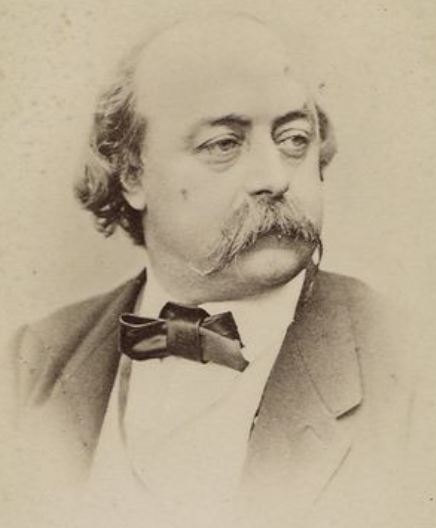Hérodias, Gustave Flaubert
Gustave Flaubert c. 1865
Author: Gustave Flaubert
Title: Hérodias
Form: short story
Published: 1877
Location: France
Published as part of Three Tales (Trois Contes), a book of short stories by Flaubert.
Reflections
Gustave Flaubert released the short story Herodias in 1877, and thoroughly imagined the historical accuracy of the place, architecture, politics and culture in which Herod, Herodias, Salome and Jokanaan actually lived. He follows the traditional narrative of Herodias using her daughter to seduce Herod so that Herod will grant Salome (directed by Herodias) any wish. He also explores the tension within Herod’s and Herodias’ marriage, and decides that Herod is reminded of the young woman he married when he sees his stepdaughter dance. Herodias’ seduction, through Salome, is an act of love on behalf of herself, her marriage, and her husband’s leadership.
There is enough detail about the embarrassment and public shame that Jokanaan has caused Herodias that we understand he is a personal threat to her as well as a political threat to the kingdom. Herod is not oblivious to this danger, but he chooses to keep Jokanaan alive in case he proves useful at a future date.
Herod’s birthday celebration is a lavish, tense event where conflicting groups have been gathered intentionally to try and reach stability. The men’s conversation is politically charged and full of suspicion and prophecy. Herodias appears on the balcony of the feast hall to announce the entertainment. Her presence is dramatic and meets the mood of the event.
Herod only knows Salome by reputation before she dances for him. When Herodias moved into Herod’s home as his new bride, she left her daughter with distant relatives until the time was right to send for her.
This is the first story to elaborate the dance that Salome performs. It is defined as erotic, acrobatic and with complex narrative. Flaubert describes Salome’s physical contortions and her movement around the room in detail. She captures the attention of all the men from varying cultures and tribes. This is the first time the guests fall silent and have a unified focus.
There is no description of a relationship between Salome and Jokanaan. The primary interactions are between the married couple, and each of them with Jokanaan.
Flaubert created a compelling platform from which Oscar Wilde made the leap to centering Salome in the request for Jokanaan’s murder.



